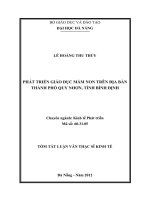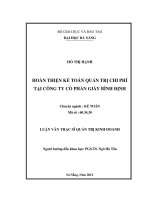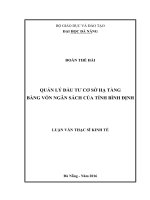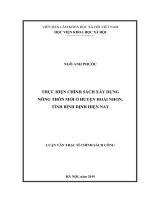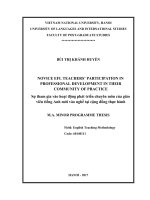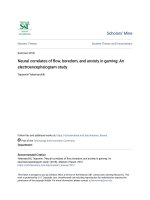Luận văn thạc sĩ novice EFL teachers professional challenges and responses in teaching english at high schools in binh dinh province
Bạn đang xem bản rút gọn của tài liệu. Xem và tải ngay bản đầy đủ của tài liệu tại đây (1.43 MB, 84 trang )
MINISTRY OF EDUCATION AND TRAINING
QUY NHON UNIVERSITY
TRAN THI TRUC
NOVICE EFL TEACHERS‟ PROFESSIONAL CHALLENGES
AND RESPONSES IN TEACHING ENGLISH AT HIGH
SCHOOLS IN BINH DINH PROVINCE
MASTER THESIS IN ENGLISH LANGUAGE EDUCATION
Binh Dinh, 2022
MINISTRY OF EDUCATION AND TRAINING
QUY NHON UNIVERSITY
TRAN THI TRUC
NOVICE EFL TEACHERS‟ PROFESSIONAL CHALLENGES
AND RESPONSES IN TEACHING ENGLISH AT HIGH
SCHOOLS IN BINH DINH PROVINCE
Field: Theory and Methodology of English Language Teaching
Code : 8140111
Supervisor: Assoc. Prof. Dr. NGUYEN QUANG NGOAN
BỘ GIÁO DỤC VÀ ĐÀO TẠO
TRƢỜNG ĐẠI HỌC QUY NHƠN
TRẦN THỊ TRÚC
NGHIÊN CỨU VỀ NHỮNG THÁCH THỨC
CHUYÊN MÔN VÀ PHẢN HỒI CỦA GIÁO VIÊN
TIẾNG ANH MỚI TẠI CÁC TRƢỜNG TRUNG HỌC
PHỔ THƠNG TRÊN ĐỊA BÀN TỈNH BÌNH ĐỊNH
Chun ngành: Lý luận và phƣơng pháp giảng dạy Tiếng Anh
Mã số : 8140111
Ngƣời hƣớng dẫn: PGS. TS. NGUYỄN QUANG NGOẠN
i
STATEMENT OF AUTHORSHIP
I hearby declare that I am the sole author of this matter thesis entiled
―Novice EFL teachers‘ professional challenges and responses in teaching English at
high schools in Binh Dinh Province‖ and that I have not used any sources other than
those listed in the references. I further declare that I have not submitted this thesis to
any other institution in order to obtain a degree.
Binh Dinh, May, 2022
TRAN THI TRUC
ii
ACKNOWLEDGEMENT
This graduation thesis would not have been accomplished without the great
assistance of all individuals around me.
First and foremost, I would like to express my deep gratitude to my research
supervisor, Prof. Dr. Nguyen Quang Ngoan, who has dedicated his time and effort
to correct and instruct me to complete my thesis despite his huge workload. Without
his enthusiasm, empathy and encouragement, this paper woud have never been
accomplised. I had no idea how fortunate I was to have such a wonderful mentor for
my M.A. thesis. I'd like to express my gratitude to him for his patience and
understanding during my difficult moments.
Next, I am grateful to show gratitude to all lecters in my M.A. course for
their committed and enthusiastic teaching over the past two years.
I must also thank to all my M.A. classmates and colleagues for giving me
useful advice during the course of study and research.
Besides, I am also indebted to the cooperation and support of 50 novice EFL
teachers in Binh Dinh Province who spent their valuable time participating in the
survey for my data collection.
Last but not least, I particularly thank to my family, friends and all of my
beloved ones who have always supported and motivated me to finish this thesis.
This study is totally created by their love and encouragement.
Quy Nhon, May 2022
iii
ABSTRACT
It is undoubtedly acknowledged that teachers play such an integral part in
teaching. Admittedly, every year, a large number of new teachers graduate from
colleges and universities and begin their teaching career. During their initial years
of teaching, they encounter a lot of challenges. Based on the theoretical background
of novice EFL teachers‘challenges, the study aims to deliver the professional
challenges faced by them. The data of the study are selected from the survey
conducted with 50 novice EFL teachers who are teaching English at high schools in
Binh Dinh Province through survey questionnaires and interviews which are two of
the principle tools adopted in the research. Specially, the purpose of the study is to
focus on exploring the professional challenges in terms of knowledge, skills and
attitude and then find out the responses or solutions to help novice teachers
overcome their challenges. The findings indicated they experienced skills
challenges and attitude challenges a little more often than the knowledge
challenges. After carrying out this thesis, the researcher hopes to find out the best
ways to help novice teachers overcome their difficulties during their teaching. There
are three effective approaches for novice EFL teachers to overcome their
professional obstacles. These responses are giving mentoring programs to newbie
teachers; more pragmatic aspects of courses should focus on the contents in order to
effectively apply theories to practice and providing more professional training on
the use of innovative student-centered teaching methods, techniques and approaches
in EFL classrooms.
iv
TABLE OF CONTENTS
STATEMENT OF AUTHORSHIP ............................................................................i
ACKNOWLEDGEMENT ........................................................................................ ii
ABSTRACT ............................................................................................................ iii
TABLE OF CONTENTS .........................................................................................iv
ABBREVIATION .................................................................................................. vii
LIST OF TABLES ................................................................................................ viii
LIST OF FIGURES ..................................................................................................ix
CHAPTER 1. INTRODUCTION .............................................................................. 1
1. RESEARCH RATIONALE .............................................................................. 1
1.2. RESEARCH AIMS AND OBJECTIVES ....................................................... 4
1.3. RESEARCH QUESTIONS ............................................................................. 4
1.4. SCOPE OF THE STUDY ............................................................................... 5
1.5. SIGNIFICANCE OF THE STUDY ................................................................ 5
1.6. ORGANIZATION OF THE THESIS ............................................................. 5
CHAPTER 2. LITERATURE REVIEW ................................................................... 7
2.1. NOVICE TEACHER PROFESSIONAL DEVELOPMENT .......................... 7
2.1.1. Definition of Novice Teachers ................................................................. 7
2.1.2. Definition of Teacher Professional Development ..................................... 8
2.1.3. The Importance of Professional Development for EFL novice teachers . 10
2.2.
NOVICE
EFL
TEACHERS‘PROFESSIONAL
CHALLENGES
IN
PREPARATION STAGE .................................................................................... 11
2.2.1. Challenges in relation to foreign language teaching and learning for high
school teachers.................................................................................................. 11
2.2.2. Challenges in relation to forms of professional support .......................... 14
2. 3. THE TYPES OF SUPPORT FOR EFL NOVICE TEACHERS .................. 17
2.3.1. Physical Support ..................................................................................... 17
2.3.2. Emotional Support .................................................................................. 18
2.3.3. Instructional Support............................................................................... 19
v
2.3.4. Institutional Support ............................................................................... 20
2.4. RELATED STUDIES ................................................................................... 21
2.5. SUMMARY .................................................................................................. 27
CHAPTER 3. METHODOLOGY ........................................................................... 28
3.1. METHODS/DESIGN OF THE STUDY ....................................................... 28
3.1.1. Research Design ..................................................................................... 28
3.1.2. Participants ............................................................................................. 30
3.2. DATA COLLECTION INSTRUMENT ....................................................... 31
3.2.1. The survey questionnaire ........................................................................ 31
3.2.2. Interview ................................................................................................. 31
3.3. DATA COLLECTION PROCEDURE ......................................................... 32
3.4. DATA ANALYSIS ....................................................................................... 33
3.5. RELIABILITY AND VALIDITY ................................................................ 35
3.5.1. Reliability ............................................................................................... 35
3.5.2. Validity ................................................................................................... 35
3.6. SUMMARY .................................................................................................. 35
CHAPTER 4. FINDINGS AND DISCUSSIONS ................................................... 36
4.1. TEACHERS‘BACKGROUND INFORMATION ........................................ 36
4.1.1. Novice teachers‗ perceptions about teaching .......................................... 36
4.1.2. Novice EFL Teachers‘ Training and Professional Development ............ 40
4.2. PROFESSIONAL CHALLENGES FACED BY BINH DINH EFL NOVICE
TEACHERS DURING THEIR INITIAL YEARS OF TEACHING ................... 44
4.2.1. Items of Knowledge Challenges ............................................................. 44
4.2.2. Items of Skills challenges ....................................................................... 45
4.2.3. Items of Attitude Challenges................................................................... 47
4.2.4. Concluding remarks ................................................................................ 48
4.3. RESPONSES OF NOVICE EFL TEACHERS ............................................. 48
4.3.1.The responses of novice EFL teachers ..................................................... 48
4.3.2. Concluding remarks ................................................................................ 50
CHAPTER 5. CONCLUSION AND IMPLICATIONS .......................................... 54
vi
5.1. CONCLUSION ON NOVICE TEACHERS‘PERCEPTIONS ABOUT
TEACHING ......................................................................................................... 55
5.2. CONCLUSION ON NOVICE EFL TEACHERS‘ TRAINING AND
PROFESSIONAL DEVELOPMENT .................................................................. 55
5.3. CONCLUSION ON PROFESSIONAL CHALLENGES IN TERMS OF
KNOWLEDGE, SKILLS AND ATTITUDE ....................................................... 56
5.4. CONCLUSION ON THEIR RESPONSES TO THEIR CHALLENGES ..... 57
5.5. PEDOGOGICAL IMPLICATIONS ............................................................. 57
5.6. LIMITATIONS OF THE STUDY ............................................................... 58
5.7. SUGGESTIONS FOR FURTHER STUDIES .............................................. 58
REFERENCES
APPENDIX
vii
ABBREVIATION
EFL
English as a Foreign Language
SLA
Second language acquisition
viii
LIST OF TABLES
Table
Page
Title Table
number
number
The extent to which novice teachers like their profession.
37
4.1
Correspondence of the Two Perceptions( as novice teacher &
39
4.2
former students).
4.3
EFL Novice Teachers Motivation
40
4.4
In-service Training for EFL Novice Teachers
42
4.5
In-service Training Effectiveness
42
4.6
Items of Knowledge Challenges
43
4.7
Items of Skills Challenges
44
4.8
Items of Attitude Challenges
46
4.9
Items of responses
47
ix
LIST OF FIGURES
Figure
Title
number
Page
number
4.1
Teaching experience of novice EFL teachers at high school
37
4.2
Perception about teaching as EFL Novice Teachers.
38
4.3
Perception about teaching as EFL Novice Teachers.
38
4.4
4.5
Correspondence of University Specialty with Teaching
Profession
The Supply of Necessary Teaching Skills by Universities
42
42
1
CHAPTER 1
INTRODUCTION
This chapter includes six parts: (1) the rationale for this study, (2) the aim and
objectives of this study, (3) research questions, (4) scope of the study, (5)
significance of the present study, and (6) the organization of the thesis
1. RESEARCH RATIONALE
Each year a great number of beginning teachers graduate from colleges as
well as from universities and start their teaching profession. These newcomers are
so numerous that one out of each ten teachers could be a member of their group.
During the primary years, many of those young teachers fail and plenty of more
gradually become discouraged and leave the teaching profession, which could help
them to make ends meet. This dilemma has faced education sector recently.
These obstacles and failures of beginning teachers are not of recent
development, they seem to have existed within the profession from its period. One
might remember their first days of teaching or greeting students for the very first
times without hiding their trembling or shaking. Graduates of pre-service teacher
education programs are frequently confronted with the realization that, as new
teachers, they must immediately begin teaching in a classroom setting. Anyone who
is teaching a new course for the first time is considered a novice teacher (Farrell,
2012, p. 437). However, in general, a novice teacher is someone who has recently
completed pre-service teacher education and has less than four years of teaching
experience. The data reveal that it is not commonplace for new instructors, even
new English teachers, to have to deal with a variety of demands from seasoned and
professional colleagues. This is a difficult task for new teachers, especially if there
isn't much professional aid and support available in the classroom.
In most parts of our province, beginning school teachers are not any longer
faced with physically forcible removal from their situations, but the actual fact that
even the most effectively adjusted of them have definite problems is clear to
oldsters, school boards, administrators, and fellow teachers alike. The importance of
2
this paper in terms of the issues' nature can scarcely be denied.
This study is going to provide two essential components. First and
foremost, beginning teachers realize that the ideals they formed while training may
not be appropriate for the realism they faced with during their first years of
teaching. That is to say, during their first few months in the classroom, novice
teachers are bombarded with a variety of situations that they have not anticipated. It
is unfortunate that this concern has not been fully addressed in schools in our
province as beginning teachers have the identical responsibility as full-time
lecturers with a few years of service. It is suggested that it is not until they
need survived the initial shock of the primary year that novices are ready to begin
to think about the fact that long-term planning, overarching student goals, and
individual student needs are all important considerations.
It has been discovered that during their first year of teaching, new
instructors ask themselves several identification questions, such as ―Who am I in
my story of teaching? Who am I in my place in school? Who am I in my children‘s
stories? Who am I in my administrator‘s stories?‖ (Connelly & Clandinin, 1999,
p.3). Given the conflicts, reality shocks, and anxieties that many studies into new
teachers' teaching experiences have identified as common characteristics of the
transition from student to teacher (Huberman, 1989; Vonk, 1993; Thomas &
Beauchamp, 2011), novice teachers often struggle to find appropriate answers to
these questions, leaving them feeling overwhelmed and challenged (Thomas &
Beauchamp, 2011).
Because there is no progressive entrance into the teaching profession,
beginning teachers‗s move from pre-service education to professional practice is
typically unsettling. Novices frequently teach like experienced teachers, allowing
them to play multiple roles such as student, teacher, and researcher (Smith & Sela,
2005). There appears to be a consensus that what is expected of an experienced
teacher is equally expected of a new teacher. Despite the fact that novice instructors
lack the attributes of experienced teachers, they are expected to match similar
standards as soon as they enter the field, and this injustice occasionally goes even
3
further, with beginning teachers receiving the most demanding teaching
assignments (Yost, 2006). This adds to the difficulties faced by new teachers. As a
consequence, ―beginning teachers leave the field at higher rates than beginning
workers in other careers‖ (Wonacott, 2002, p.3).
Numerous studies on novice teachers of English have been conducted in
terms of covering several aspects of novice teachers. Research by Brannan and
Bleistein (2012), for instance, reported that novice teachers were desperately in
need of support from their mentors, both of logistical knowledge and of those
related to professional and pedagogical competences. Moreover, research by Ai
Phuong (2015) explored the construction of professional identity of a novice EFL
teacher in Vietnam. However, these studies were conducted on novice teachers of
secondary schools and just explored the profession identity of novice teachers. In
other words, although much has been written in the educational literature about
novice teachers' experiences in their first years of teaching, the subject has received
less attention in the fields of English language teaching (ELT) and language teacher
education.
Compelled by this very fact, the piece of writing ―Novice EFL Teachers’
Professional Challenges and Responses in Teaching English at High Schools in
Binh Dinh Province” is aim to thoroughly examine professional challenges that
novice teachers in our province face in their early experience of teaching at high
schools through a review of serious literature. Supported recent studies from the
literature, these professional challenges are discussed and future direction for
research during this field is recommended. Secondly, it is necessary to come up
with pragmatic implications so as to support new teachers, helping them to solve the
challenges that they are likely to encounter in their daily tasks and duties. This
paper also provides specific advice as well as tips for finding solutions to real
teaching challenges, all of which are summarized in brief and comprehensive ways
teachers can be able to apply in the reality and keep for future reference.
For the purpose of finding out what problems beset the beginning teachers,
a survey was made of fifty teachers in high schools. The term ―beginning teachers‖
4
in this study refers to those teachers who have had no more than five years of
teaching experience. The schools range from the very small to the very large and
from the poorly equipped to the most modernly equipped.
Unfortunately, the majority of English teachers in our province in general
and in high schools in particular have not had any opportunities or chances of being
heard or listened in terms of their daily struggling. They have to accomplish their
tasks as well as duties without being provided any kinds of pragmatic assistance.
The most effective components in English language education are
teachers. They play an essential role in the learning and achievement (DarlingHammond, 2003). According to Shafie and Nayan (2010), knowledge transmitter,
role model, facilitator, student assessor, curriculum assessor, and course planner are
some of the primary tasks instructors are required to play in educational settings.
Teachers are expected to have proper training and qualifications due to the crucial
responsibilities they play. As a result, in this research, it is expected to have a closer
look atall of the participants‘ professional challenges, as well as their attitudes
towards not only their own obstacles but also their co-workers and peers. Moreover,
the focus of the study is also looking for particular suggestions or pieces of advice
or support to help the novice teachers in their own career of teaching.
1.2. RESEARCH AIM AND OBJECTIVES
This study aims to investigate the professional challenges of EFL teachers
in their initial years of teaching at high schools in Binh Dinh Province.
To achieve this aim, the researcher tries to fulfill the following objectives:
- To identify the professional challenges experienced by novice teachers.
- To examine how they respond to their challenges.
1.3. RESEARCH QUESTIONS
In order to achieve the aim and objectives, this study attempts to address the
two subsequent questions:
1. What are the professional challenges in terms of knowledge,
skills and attitude experienced by novice teachers?
5
2. How do novice teachers respond to their challenges?
1.4. SCOPE OF THE STUDY
This study concentrates on particular professional challenges of English
teachers as they need to continually search for distinctive approaches to cope
with extra issues which will arise each day. Besides, this paper also provides useful
and pragmatic implications or suggestions which might partially assist novice
teachers to beat these obstacles. The study is conducted at some high schools in
Binh Dinh Province. The participants are fifty beginning teachers, who have been
teaching English as a foreign language for almost five years.
1.5. SIGNIFICANCE OF THE STUDY
Theoratically, there has been so far no investigations into the professional
challenges faced by novice EFL teachers; it thus helps to provide valid data to
tackle the difficulties.
Pedogogically, three components that have had great influence on English
teaching profession related to professional challenges consist of knowledge, skills
and attitude.
Practically, the study benefits for novice teacher to have a better
understanding of the major challenges. Besides, this research also provides
encouragement at the start of their teaching careers. As a result, novice teachers
may obtain better approaches of individualizing learning and teaching processes; in
working with students who have special educational needs; in cooperating with
parents and in motivating students to learn and other.
1.6. ORGANIZATION OF THE THESIS
The thesis is divided into five chapters:
Chapter 1 consists of the research rationale, the aims and objectives,
the research questions, the scope, the significance of the study.
Chapter 2 includes the information about some concepts relating to
common problems that novice EFL teachers face.
Chapter 3 comprises the research methods and procedures.
Chapter 4 presents the findings and discussion.
6
Chapter 5 concludes the study, informs some limitations of the study
and gives some suggestions for future research.
7
CHAPTER 2
LITERATURE REVIEW
This chapter discusses the theoretical background to the thesis and reviews the
previous studies. The former includes four main part: (1) Novice teacher
professional development, (2) novice EFL teachers‘professional challenges in
preparation stage and (3) types of support for EFL novice teachers and (4) related
studies.
2.1. NOVICE TEACHER PROFESSIONAL DEVELOPMENT
2.1.1. Definition of Novice Teachers
In research on beginning teachers, the term "novice" has been often used,
and as Farrell (2012) pointed out, there is no clear-cut definition of a novice teacher
in the literature. Anyone teaching something new for the first time or entering a new
cultural context for the first time is considered a novice (Farrel, 2012). There is also
no agreement on how many years of teaching are required to complete the novice
stage. A novice, according to some studies, is a teacher with less than five years of
experience (Kim & Roth, 2011). Others referred to it as an instructor with no more
than two years of experience (Haynes, 2011).
The phrase novice teachers, also known as beginning teachers, pre-service
teachers, and neophytes, have been used in a variety of studies. The word "novice
teacher" is sometimes used in conjunction with the term "induction," which refers to
the early phase of one's career or the system of support that may be available during
that phase (Strong, 2009).
The majority of studies focus on the importance of the initial years of
teaching in a teacher's career, as well as how teachers' experiences impact their
identity and future practices. Pitton (2006) argued that ―the success of new teachers
is critically linked to their first teaching experiences and the opportunities they are
given to talk through issues they face in the classroom‖ (p. 2). If they are left alone
with their problems and begin to feel ineffective, they will conclude that they are
unfit for the job and will quit. Researchers have referred to the gap between pre-
8
service education and in-service development as one of the causes for the increase
in teachers leaving the profession. Following their university education and
employment, novice teachers lose contact with their teacher educators, and they
face the same issues as their more experienced colleagues on the first day of school
with little guidance from their new school (Farrell, 2012). When statistics on
dropout rates are evaluated, it is clear how terrible the problem is. ―25% to 50% of
beginning teachers leave during their first three years of teaching, and nearly 10%
leave in their first year‖ (Ozturk, 2008, p. 20). These figures highlight the need of
investigating the issues that novice teachers face and assisting them in overcoming
their difficulties during their first years of teaching.
In this study, I define a novice teacher as a teacher with less than five years
of experience in the classroom as suggested by Kim & Roth, (2011). I focus on the
professional challenges of novice language teachers. Furthermore, I explore the
types of support needed and their availability.
2.1.2. Definition of Teacher Professional Development
Professional development (PD) has been utilized in a variety of
circumstances; in some ways, it emphasizes the idea that teaching is a profession,
and it is thus defined in several ways. Wong, M.S. (2011) describes PD in the
context of English teaching as "a lifetime endeavor, a way of being, and a
perspective on how one practices as well as the practice itself." In other words,
professional development raises instructors' working practices to a higher level. PD
can also be defined as "the engagement of individuals in any activity for the
enhancement of their capacity at work and to gain, improve, and share a body of
knowledge and skills that are relevant to perform particular duties in their
workplace.", according to Alemu (2014). As a result, professional development that
strives to improve teachers' knowledge, skills, and attitudes includes both formal
and informal experiences such as reading professional publications, watching
television documentaries relevant to an academic topic, and so on. As a result,
Richards, J.C., and Farrell, T.S.C. (2005) noted that it has become more
acknowledged in recent years that both EFL and ESL teachers require professional
9
development.
Various researchers have characterized teacher professional development.
Professional development is the process of a person growing in his or her work role.
In teaching, it is characterized as a process by which teachers can engage
individually or collaboratively to reflect on and improve their teaching performance,
as well as to widen their knowledge, skills, and physical interaction, all of which are
critical to their teaching careers. Professional development, according to Craft
(2002) and Gey (2000), is defined as the improvement of a teacher's profession as a
result of reflection and learning from both personal experiences such as workshops,
short-term or long-term training programs, and informal learning from professional
publications and documentaries in the field of education. Teacher professional
development is characterized by Coetzer (2001) as orientation, training, and
support.
Many researchers have defined and discussed teacher professional
development under the terms teacher development and professional development
(Castellano and Datnow, 2000; Pham, 2001; Kent, 2004). Lange (1990) defines
teacher development as "a continual intellectual, experiential, and attitudinal growth
of teachers" (p. 250). He believes the process begins before and continues
throughout his teaching career. Professional Development, according to Hassel
(1999), is the process through which teachers develop both the skills and the
competence required to achieve outstanding educational results.
"Teacher development" is distinguished from "teacher training" by Head
and Taylor (1997). In many ways, the two terms are implicitly different from each
other. Teacher development, on the one hand, is usually voluntary, holistic, longterm, bottom-up, and done with peers, whereas teacher training is, on the other
hand, mandatory, competency-based,
short-term, top-down, and done by
specialists. Teacher development is "an ongoing process which includes
appropriate, well-thought-out training and individual follow-up," according to Kent
(2004, p.428). The contrasts suggest that professional growth necessitate lifelong
learning and personal knowledge of changes in the teaching profession for teachers.
10
Teacher Professional Development can be characterized in terms of Teacher
Development or Professional Development to some extent. Some researchers also
make a distinction between teacher development and professional development. For
instance, "teacher development" refers to a classroom focus, whereas "professional
development" refers to a career focus (Duong, 2003).
Although researchers sometimes confuse the two terms, they share
comparable concepts and assumptions about the tools and options that teachers
might use to improve their teaching practices and advance their careers. As a result,
the terms Teacher Development and Professional Development will be used
interchangeably in this thesis, and can be viewed as a change in a teacher's status as
a teacher.
2.1.3. The Importance of Professional Development for EFL novice teachers
Several studies have demonstrated and supported the importance of teacher
professional development. With the impact of globalization, teaching tendencies are
constantly updated. If English teachers are not to be left behind in their careers, they
must renew their pedagogical techniques and skills in order to satisfy the needs of
educational institutions (Richard & Farrel, 2005). As a result, the development is
likely to have an impact on perspectives and approaches, thus improving the quality
of the learning and teaching process (Day & Sachs, 2004). Professional
development programs are designed to enable and support teachers, regardless of
where they teach or their professional background, and to provide the best
instructional support possible so that they can improve themselves by boosting
competence, confidence, and commitment, as well as facilitating a sense of joy in
teaching (Day & Sachs, 2004). Professional development for teachers benefits
students' learning as well. Researchers have discovered that when students study
with teachers who have a better understanding of how pupils learn, they do a better
job in learning. Successful professional development of instructors, according to
Falk (2001) and Guskey (2000), leads to learners making progress in their learning.
Changes in instructional strategies, classroom management, and teacher-student
interaction may have a direct impact on student results. Furthermore, professional
11
development can greatly help to the advancement of educational institutions by
building professional strength and highly skilled teaching forces that can effectively
meet the institution's requirements ( Richard & Farrel, 2005).
Professional development is vital to modifying teachers' teaching
approaches, enhancing educators' prestige, and ensuring that these changes have a
favorable influence on students' learning (Nunan, 2001). Professional development,
according to Villegas – Reimers (2003), had a favorable impact on instructors'
beliefs and practices, as well as on students' learning. In other words, professional
development had a significant impact on teachers' instructional objectives. As a
result, EFL teachers require a complete professional program at all phases of their
careers, as their competency affects both their learning and teaching practice. They
can learn new concepts, skills, and attitudes, as well as investigate, debate, and
reflect on new ideas, as well as test out new techniques and incorporate them into
their profession. That is why ongoing professional development is so important in
the educational process, and the more professional knowledge teachers have, the
greater the levels of achievement students achieve ( Falk, 2001).
2.2. NOVICE EFL TEACHERS‟PROFESSIONAL CHALLENGES IN
PREPARATION STAGE
2.2.1. Challenges in relation to foreign language teaching and learning for high
school teachers
2.2.1.1. Academic Problems
Farrell (2009) defines novice teachers as ―teachers who have completed
their teacher education program and have just commenced teaching in an
institutional institution‖ (p.182). Research has shown that novice instructors
confront worries and obstacles during their "learning to teach" process (Fuller &
Brown, 1975), as they endeavor to create their teacher - self and formulate their
identities (Miller, 2009). As a result, the first year of teaching is regarded as
unpredictable, idiosyncratic, and anxiety-inducing (Johnson, 2002).
One of the foremost obvious problems is that the inability to improvise
creatively, respectfully and with knowledge, because they are doing not have the
12
power to show and apply what they know—nor do they need the experience needed
to understand the difference between teaching and studying (Wilson and Ball,
2002). This concentrates the essence of educational problems involving everything
associated with being answerable of a bunch of scholars.
It has been found that novice teachers have difficulties in areas like
controlling the group and maintaining discipline (Boreen and Niday, 2000; Zepeda
and Mayers, 2001), which they lack adequate teaching strategies (Frieberg, 2002).
Similarly, Reynolds (2005) assures us that inexperienced teachers lack the power to
form opportunities for all students to be told. In fact, Wilson and Ireton (2007)
found in their study of beginning teachers‘ fears, that one amongst these fears
involves not knowing a way to cope with students who have learning disabilities.
Additionally to the present, many beginning teachers lack sufficient knowledge
about a way to plan the educational program and even about the content of the
themes they teach.
When stepping into a new organization, novice teachers easily get stressed
and anxious to familiarize with its internal environment, their new duties and roles.
They must meet skill standards as well as exhibit socially acceptable and expected
behavior in order to be competent members of the new workplace (Saks & Gruman,
2012). In the educational context, novice teachers are expected to equip themselves
with professional knowledge, norms, values, manners of behavior, and the ability to
adjust to new environments during the period of socialization (Eisenschmidt, PoomValickis, & Kamer 2011). Several prior studies have found that novice teachers face
numerous problems throughout their first three years of teaching. Time balance,
assessing students, low ability to maintain positive relationships with coworkers,
lack of time for paper work, establishing connections with students, issues in
aligning instructional strategies to the teaching content, and assessment are all
major challenges that Cakmak (2013, p.56) discovers. Buchanan (2013) goes on to
say that new teachers face a lot of solitude and a lot of work at work, which can
have a big impact on their mental health if they don't get help right away.
Insufficient institutional support, a lack of teaching experience, a lack of
13
confidence, and apprehension about their capacity to handle a large number of duts
were cited as some of the hurdles (Caspersen & Rasen, 2014). The majority of
research have agreed that entering shock affects novice teachers in terms of
psychology, self-confidence, and maintaining connections. They must deal with
these issues while building their own identities (Northfield & Gunstone, 1997).
Lack of institutional support and unpleasant employment conditions, according to a
study by Boser (2002) that looks at the causes of high attrition of novice teachers,
leads to cases of quitting in the first few years.
2.2.1.2. Organizational Problems
Stansbury (2001) proposes some suggestions that it is extremely vital to guard
beginning teachers because of their own enthusiasm that they are supersaturated
with responsibilities, like participation in extracurricular activities, clubs and
committees. Carter and Francis (2001) also stated young mentors are better at
emphasizing and recalling what it is like to be a beginning teacher; the foremost
difficult duties and tasks outside the classroom classes; the evaluations nobody
wants to make; and moreover, nobody supports them or monitors their progress. In
relevance to this matter, and particularly in Spain, Acevedo and Hornos Castillo
(cited by Carmen, 2003) investigate the workload of teachers at public schools.
These authors emphasize the issues of an organizational nature, relative to the
support the college does or does not give to beginning teachers.
Regarding this area, the inexperienced teachers indicate the dearth of adequate
induction courses by the varsity (Johnson and Kardos, 2002). Vennman (cited in
Bullough, 2009) adds at the college where they work there will be rules everyone
knows and respects; but often they are doing not find this information; they describe
this as ―the trauma of reality.‖ On the opposite hand, the principal‘s help, so important
during the primary year (Brock and Grady, 2008), isnot always available.
Efficacy and social acknowledgment are the two basic sources of selfaffirmation (Kelchtermans and Ballet, 2002; Rots, Kelchtermans, and Aelterman,
2012). Efficacy refers to a novice teacher's ability to carry out his or her
professional actions in accordance with his or her task perception and to achieve
